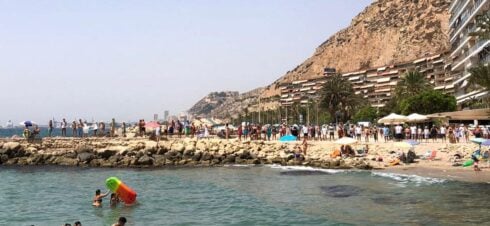HUMAN chains were formed on beaches across the Valencia and Murcia regions on Saturday to demand action to stop sand erosion and potential evictions of home owners.
The protests organised by Somos Mediterranea blame sand erosion on the construction of dams and ports plus the effects of storms in recent years.
The platform also says that latest Coastal Law reforms including plots now being classified as public domain land will result in the demolition of homes- some of which have been around for ‘centuries’.
READ MORE:
- British expats among dozens to lose full ownership of their homes due to controversial ‘Coastal Law’ on Spain’s Costa Blanca
- Thousands of homes, hotels and beach bars face being ‘taken’ by the government ‘to protect the coastline’ of Spain – all you need to know about the proposed law
- Senate votes to end ‘unique’ coastal homes being classified as being on public domain land in Spain BUT decision could be overturned

Last autumn, around 100 homeowners of coastal properties in Denia said they have been threatened with losing full control of their homes because of the legislation.
Federico Aniorte from Somos Mediterranea said: “Instead of protecting what is needed, the Coastal Law is being applied to expropriate and banish families who have had their legal home since time immemorial, without compensating them and even making them pay for the demolition of their property.”
Human chains appeared on several beaches in the Valencian Community including Malvarrosa, Gandía, Guardamar and Sagunto as well as Cabo de Palos in Murcia.
A Partido Popular deputy in the Valencian parliament, Ignacio Aleixandre, attended the protest in El Perello.
“A new Coastal Law is needed for people and the environment and I’ve joined the chain because our beaches are suffering a significant deterioration that threatens their disappearance,” said Aleixandre.
“We are here supporting dozens of neighbours and owners who see their heritage or their businesses in danger because of left-wing governments that mistreat our beaches, our tourism and our coasts.”
“It is about making the right to property compatible with action to preserve and protect the coast,” Alexiandre added.










